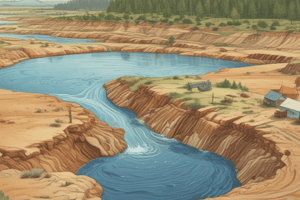Podcast
Questions and Answers
Which of the following is NOT a route through which water pollution can reach groundwater?
Which of the following is NOT a route through which water pollution can reach groundwater?
- Unregulated industrial waste
- Leaking sewage systems
- Natural mineral dissolution
- Properly managed agricultural runoff (correct)
Why is groundwater difficult to monitor and purify once contaminated?
Why is groundwater difficult to monitor and purify once contaminated?
- Contaminants may travel long distances (correct)
- Contaminants degrade quickly in groundwater
- Groundwater is easily accessible for treatment
- Groundwater flows at a slow rate
What is a significant challenge related to managing contaminated groundwater?
What is a significant challenge related to managing contaminated groundwater?
- Easy access to contaminated areas
- Identifying the exact source of contamination (correct)
- Contaminants staying localized near the source
- Rapid cleanup within a few months
Why has sustainable groundwater use become increasingly important?
Why has sustainable groundwater use become increasingly important?
What contributes to groundwater contamination aside from human activities?
What contributes to groundwater contamination aside from human activities?
What is one key strategy for effective groundwater management to prevent contamination risks?
What is one key strategy for effective groundwater management to prevent contamination risks?
How can groundwater recharge be promoted for sustainable groundwater use?
How can groundwater recharge be promoted for sustainable groundwater use?
Which practice is NOT a strategy for sustainable groundwater use?
Which practice is NOT a strategy for sustainable groundwater use?
What are some challenges associated with groundwater management?
What are some challenges associated with groundwater management?
What role do protective barriers play in groundwater management?
What role do protective barriers play in groundwater management?
Study Notes
Groundwater: A Vital Resource with Complex Challenges
Groundwater is an essential component of our global water cycle, supplying water for drinking, agriculture, and industrial needs. It's found beneath the Earth's surface in porous rocks and soil, and its management has become increasingly important as our populations and demands grow. This article will explore groundwater's vulnerability to pollution, contamination risks, the need for sustainable groundwater use, and the strategies involved in managing this critical resource.
Water Pollution and Groundwater
Water pollution can reach groundwater through various routes, such as:
- Leaking sewage systems: Old or damaged pipes can transport wastewater into the ground, contaminating groundwater sources.
- Unregulated industrial waste: Storage tanks or open pits can leak chemicals into the ground, seeping into aquifers.
- Agricultural runoff: Pesticides, fertilizers, and manure can wash into groundwater when not managed properly.
Contamination can also occur from natural sources, like mineral dissolution or geogenic pollution.
Contamination Risks
As groundwater is difficult to monitor and purify, once contaminated, it can take decades to centuries to clean up. Contaminants may travel long distances, making it difficult to pinpoint their source. Currently, groundwater contamination is a significant global issue, with more than 2 billion people worldwide potentially affected by it.
Groundwater Management
Effective groundwater management is crucial to maintaining its quality and sustainability. Some key strategies include:
- Monitoring and regulation: Regularly monitoring water quality and adopting regulatory measures to ensure compliance with environmental standards.
- Protective barriers: Implementing buffers around groundwater sources to prevent agricultural, industrial, or domestic contamination.
- Sustainable water use: Encouraging efficient water use through technological advancements, education, and public awareness.
- Groundwater modeling: Using computer models to analyze groundwater flow and contaminant transport, helping to predict and manage potential risks.
Sustainable Groundwater Use
Sustainable groundwater use ensures that water resources remain available for future generations. Some strategies to promote sustainable groundwater use include:
- Sustainable agriculture: Encouraging water-efficient farming practices, such as drip irrigation, crop rotation, and integrated nutrient management.
- Regulations and pricing: Implementing groundwater management regulations and pricing policies that promote efficient water use and discourage over-extraction.
- Groundwater recharge: Encouraging the recharge of groundwater through practices such as rainwater harvesting and artificial recharge to maintain water levels and prevent salinization.
Challenges and Opportunities
Groundwater management presents both challenges and opportunities. Challenges include the complexity of groundwater systems, limited monitoring capabilities, and the difficulty of implementing sustainable management practices. However, opportunities for groundwater management include technological advancements, public awareness, and international collaboration.
As our global population continues to grow, groundwater will remain a vital resource. By understanding its vulnerabilities, risks, and management strategies, we can ensure its sustainability for future generations.
Studying That Suits You
Use AI to generate personalized quizzes and flashcards to suit your learning preferences.
Description
Explore the complexities of groundwater management and sustainability in this quiz. Learn about contamination risks, sustainable water use strategies, groundwater modeling, and challenges in maintaining this vital resource.




